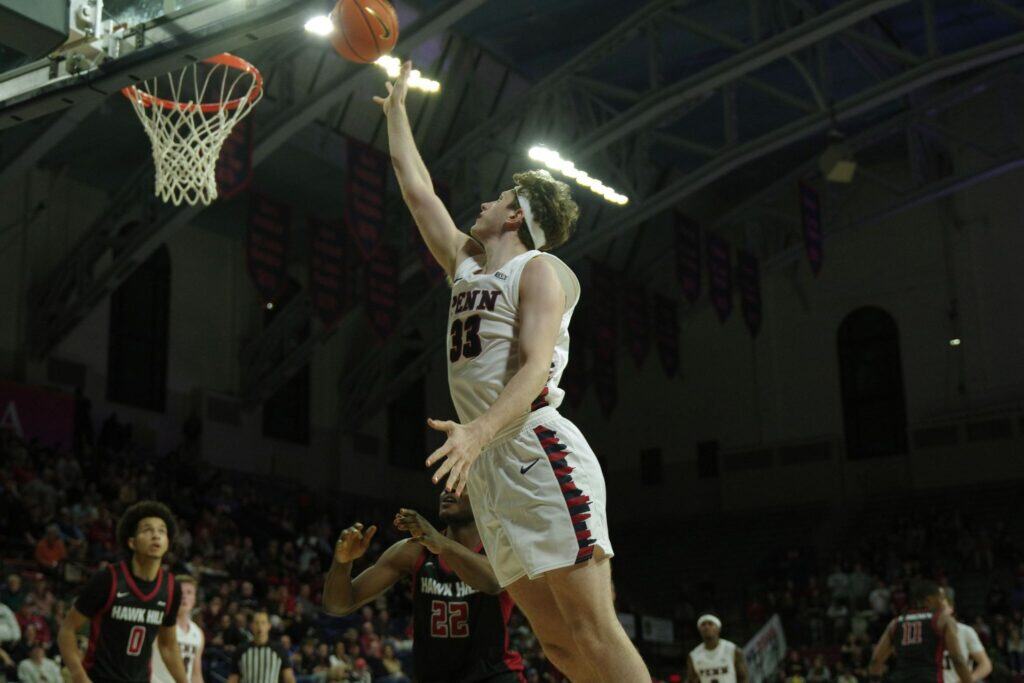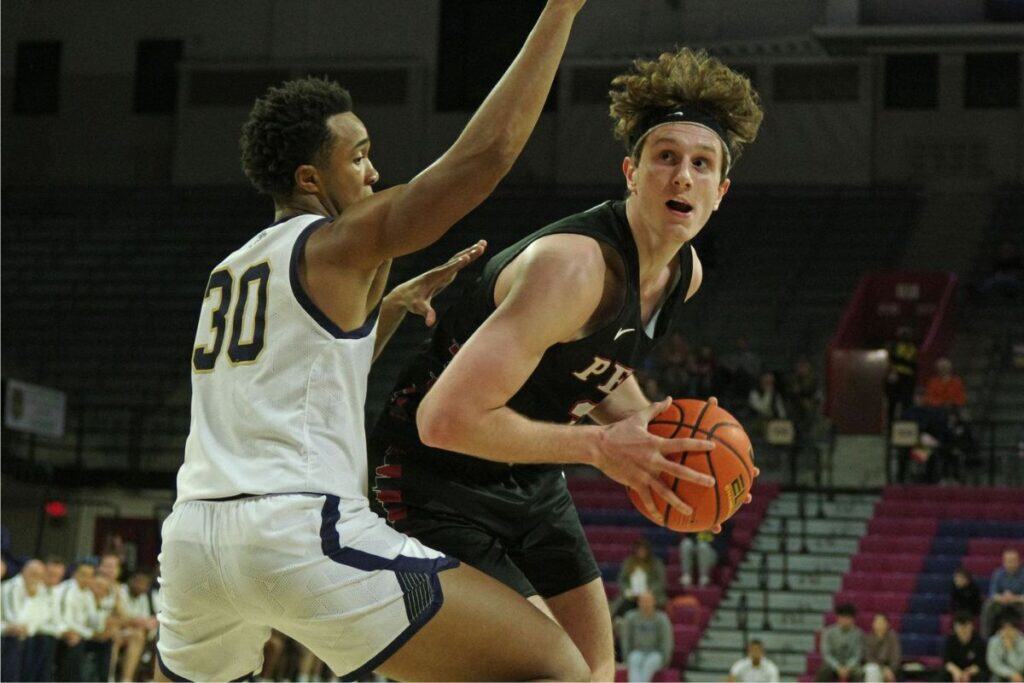An Italian in the Ivy League. Usually, this is how a TV news segment starts, and it’s less common in a sports article. Yet Michelangelo Oberti has managed to combine the sports side—being a forward on a Division I team—and the academic side, landing at one of America’s top universities.
Now in his second year of college—though he arrived in the US much earlier, during high school—Oberti spoke to us about his American experience halfway through his term. From the physical improvements required to play at the highest level, anecdotes from the past, and an NIL system that doesn’t quite adapt to international students, here is our interview.
Raised basketball-wise in Bergamo, before moving to America at 15. Tell us about that first step: where did the idea come from and what were your high school years like, where you dominated quite a bit?
The idea came from wanting to follow my brother Leonardo’s path (born 2002), who spent a year in America (also in New Jersey) as a junior in high school. I often think about my high school years; I consider them the best years of my life. I was surrounded by amazing people, first and foremost my coach, David Grande, whom I still keep in touch with frequently. I also think about my teammates, especially the Italians, with whom I spent countless hours both training and improving on the court and laughing and creating memories off the court that I will treasure forever. In basketball, I made important progress—my first year, I wasn’t great yet, but showed glimpses of what I later demonstrated. In my second year, I made a leap forward becoming the team’s focal point. During my last year, already knowing where I would go to college, I played without needing to prove anything to anyone, enjoying the game and playing as I know how.
The high school route is less common than going straight to college: how useful was it for you to arrive in America earlier? Did it make the transition less traumatic?
I think the high school route was a good idea. It gave me many experiences that eased the transition to college. Obviously, learning the language better helps, but seeing the different American style of play in person is special. My move from high school to college was not traumatic at all; by then, I already knew what to expect, and having fewer doubts always helps.

Tell us about your first approach with recruiting: which teams contacted you, what did they see in you, how did they try to convince you?
My memory is a bit hazy now, but I remember in my first year many Division III schools targeted me, though they couldn’t contact me yet. In my second year, I started communicating with many coaches, mostly Division III and II, in preseason. Everyone obviously saw me as a prospect—it’s rare to see someone as tall as me at 16. I was still quite raw in basketball terms, but one thing that can’t be taught is height. During the season, I proved myself with several great performances that caught the attention of the first Division I programs. In the postseason, I talked with various Division I coaches, receiving my first offer from Rider University, a local Division I school. I also spent part of my summer working with a coach in America, participating in several high-level tournaments where I received strong interest and offers, including from Penn, where I am now.
Why Penn? You are in the Ivy League, basically among future American Nobel Prize winners. Tell us about this environment and what you are studying.
I was raised with the mentality that school comes first. Not to brag, but as far as I know, I could break my career tomorrow and be fine. My parents always told me that one day the ball will stop bouncing, no matter how strong you are. I have always been a scholar; for example, in high school, I earned the title of Valedictorian (the student with the highest academic performance in the class, who gives the graduation speech), despite studying in English. When I arrived in America, I already had in mind to attend a college with an excellent basketball program and a top-level academic program. Penn epitomizes my desire. They have a long history of basketball success, and the academic level is among the highest in the world—literally what I was looking for. Despite all that, the environment is quite normal, obviously by American standards. I am surrounded by intelligent, creative, and courageous people. Many come from other countries like me, bringing viewpoints and perspectives that enrich the school culture. I haven’t decided what to study yet; I have until the end of the year to choose.
A complicated first year: many losses, a young team, many games against Villanova, Penn State, VCU, George Mason. Tell us about the year both personally and as a team.
My first year was absolutely complicated. As a team, we were (in my opinion) much better than what we showed. There was talent, grit, and hunger to win, but we often failed to put it all together to get more wins. Personally, I played relatively a lot for a freshman, even if I didn’t do much. Usually, you don’t start in your first year at college, but I was lucky. Despite that, I kept working hard, talking to coaches about how to improve, and putting countless hours on the court and in the gym.
When you arrived at Penn, what were you asked to work on?
It was obvious what I had to do. I weighed 220 pounds soaking wet. Gaining weight and becoming physically stronger was the first and biggest request. I took my nutrition and workouts very seriously, gaining more than 22 pounds of muscle in a year. Obviously, the speed of the game is faster in college, so cardio was a focus too.
Let’s talk about NIL. It has also been opened to international athletes, though in theory you cannot do any activity. You are in the Ivy League, a conference historically reluctant to give scholarships, let alone pay players. How is the university handling this?
Honestly, I have somewhat resigned myself to receiving NIL deals. The Ivy League is making big steps toward getting money to their athletes, but as an international player, I have very little room to maneuver, and risking my visa for some money isn’t worth it. Other Division I conferences are doing a good job paying their athletes, and I think NIL is becoming a bigger factor in recruiting, both locally and internationally. It is much easier to “steal” European/international talent if you can offer them a nice sum as well.
What are your personal goals for next season? What will you need to work on?
I want to keep working on my body, basketball IQ, cardio, and my off-the-ball game. Obviously, I could write an endless list, but I think these are the most important. As personal goals, I want to be a defensive rock for my team. I want to be a player people can always count on for a solid, impactful performance. But mostly, I want to win; I don’t care how. Winning elevates a team in a unique way.
You come from an off-season. What are the expectations for this season?
To be better than last year, obviously. With a complete staff overhaul, there are many expectations, and I believe we’ll meet them. We are a special team and are working hours every day to achieve these goals. The new coaches are much more intense, and you can tell they have a great hunger as well. We want to win the Ivy League. We want to play in March Madness. Not just play—we want to be competitive there.
How was your summer?
All my summers in Italy are great. I can finally relax a bit, see my family, my friends, and enjoy home. I also had surgery on my septum, fixing a problem I’ve had since birth. I wasn’t able to breathe through my nose before; this surgery was a huge change. Obviously, I also trained a lot.
Final question: when your NCAA journey ends, what would make you happy to have achieved?
I think I will be happy anyway. This path has been truly unique, completely changing my life, and I wouldn’t change a thing. Winning the Ivy League at least once, though, is a must. I will definitely be happy to leave the NCAA with no regrets.
